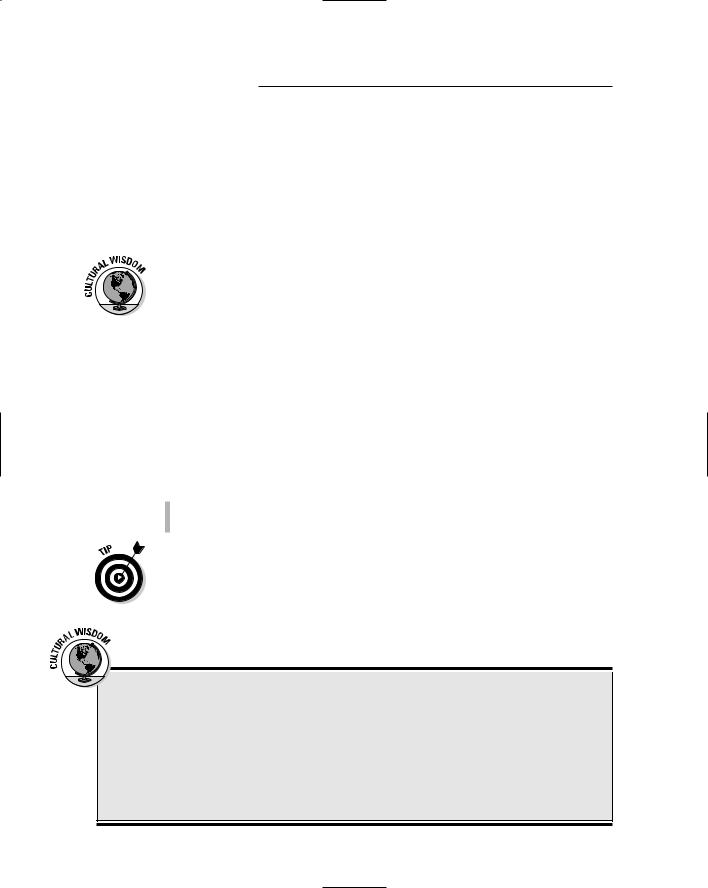
Russian For Dummies
.pdf
74 |
Part I: Getting Started |
Break the Ice: Making Introductions
Making a good first impression is important for the beginning of any relationship. Russians tend to be more formal than Americans in how they approach a person they’ve just met. In the following sections, we show you the best ways to introduce yourself to somebody you’ve just met. We also show you phrases to use when getting acquainted with someone, how to ask for somebody’s name, and the best way to introduce your friends, colleagues, and family to new people.
Getting acquainted
In English, introducing yourself is the best way to start a conversation with somebody you don’t know. Not so in Russian. When introducing themselves, Russians are a little more ceremonial. Russians like to begin with first suggesting to get acquainted by saying “Let’s get acquainted!” They have two ways to say this, depending on whether they’re on formal vy (vih) or informal ty (tih) terms with the person (see “Who Am I Speaking To? Being Informal or Formal” earlier in this chapter for info on these terms). Check out Table 3-2.
Table 3-2 |
Asking to Become Acquainted |
|
Introduction |
Pronunciation |
Meaning |
Formal: Davajtye |
duh-vahy-tee puhz-nuh- |
Let’s get acquainted! |
poznakomimsya! |
koh-meem-sye |
(addressing a person formally |
|
|
or two or more people) |
|
|
|
Informal: Davaj |
duh-vahy puhz-nuh- |
Let’s get acquainted! |
poznakomimsya! |
koh-meem-sye |
(addressing a person |
|
|
informally) |
|
|
|
If somebody says one of these phrases to you, you should politely accept the suggestion. To respond, you can just use the first word, which makes your task much easier (see Table 3-3).

|
|
Chapter 3: Zdravstvujtye! Privyet! Greetings and Introductions |
75 |
||
|
|
||||
|
|
|
|
|
|
|
Table 3-3 |
Agreeing to Become Acquainted |
|
||
|
Response |
Pronunciation |
Meaning |
|
|
|
Formal: Davajtye! |
duh-vahy-tee |
Okay (Literally: Let’s; addressing |
|
|
|
|
|
|
a person formally or two or more |
|
|
|
|
|
people) |
|
|
|
|
|
|
|
|
Informal: Davaj! |
duh-vahy |
Okay (Literally: Let’s; addressing |
|
|
|
|
|
|
a person informally) |
|
|
|
|
|
|
|
Asking for people’s names and introducing yourself
The formal version of “What is your name?” is Kak vas zovut? (kahk vahz zah-voot?; Literally: What do they call you?) The informal version of “What is your name?” is Kak tyebya zovut? (kahk tee-bya zah-voot; Literally: What do they call you?)
To introduce yourself in Russian, just say Myenya zovut (Mee-nya zah-voot) + your name. (See “Not So Simple: Deciphering Russian Names,” earlier in this chapter, for details about Russian names.)
When introducing yourself, Russian doesn’t distinguish between formal and informal. You use the introduction Menya zovut in both formal and informal situations.
After you’re introduced to someone, you may want to say, “Nice to meet you.” In Russian you say ochyen’ priyatno (oh-cheen’ pree-yat-nuh; Literally: very pleasant). The person you’ve been introduced to may then reply mnye tozhye (mnye toh-zheh; same here). You use the phrases ochyen’ priyatno and mnye tozhye in both formal and informal situations.
Introducing your friends, colleagues, and family
Everyday, common introductions are easy in Russian. When you want to introduce your friends, all you need to say is Eto . . . (eh-tuh; This is . . .) Then you simply add the name of the person (see “Not So Simple: Deciphering Russian Names” earlier in this chapter for more info about names).

76 |
Part I: Getting Started |
To indicate that the person is an acquaintance or a colleague, you say one of two things:
If the person is a man, you say Eto moj znakomyj (eh-tuh mohy znuh- koh-mihy; This is my acquaintance).
If the person is a woman, you say Eto moya znakomaya (eh-tuh mah-ya znuh-koh-muh-ye; This is my acquaintance).
As in English, the same construction (Eto + the family member) applies to a broad circle of people including your family members. For example, to introduce you mother, you say Eto moya mama (eh-tuh mah-ya mah-muh; This is my mother); to introduce your brother, just say Eto moj brat (eh-tuh mohy braht; This is my brother). To introduce other members of your family, see Chapter 4, where we provide words indicating other family members.
Talkin’ the Talk
Anna is approached by her friend, Viktor, and his acquaintance,
Boris Aleksyeyevich:
Viktor: |
Oj, privyet, Anna! |
|
ohy, pree-vyet, ah-nuh! |
|
Oh, hi Anna! |
Anna: |
Privyet Viktor! Kak dyela? |
|
Pree-vyet veek-tuhr! kahk dee-lah? |
|
Hi, Viktor! How are you? |
Viktor: |
Nichyego. A u tyebya. |
|
nee-chee-voh. ah oo tee-bya? |
|
Okay. And you? |
Anna: |
Nyeplokho. |
|
nee-ploh-khuh. |
|
Not bad. |
Viktor (to Anna): |
A eto moj znakomyj, Boris |
|
Alyeksyeyevich. |
|
ah eh-tuh mohy znuh-koh-mihy, |
|
bah-rees uh-leek-sye-ee-veech. |
|
And this is my acquaintance, Boris |
|
Alekseevich. |

|
Chapter 3: Zdravstvujtye! Privyet! Greetings and Introductions |
77 |
|
|
|||
Anna (to Boris Aleksyeyevich): |
Zdravstvujtye! Davajtye |
|
|
|
|
poznakomimsya! |
|
|
|
zdrah-stvooy-tee! duh-vahy-tee |
|
|
|
puhz-nuh-koh-meem-sye! |
|
|
|
Hello! Let’s get acquainted! |
|
Boris Aleksyeyevich: |
Davajtye! Myenya zovut Boris. |
|
|
|
|
duh-vahy-tee! mee-nya zah-voot |
|
|
|
bah-rees. |
|
|
|
Let’s! My name is Boris. |
|
Anna: |
Ochyen’ priyatno! |
|
|
|
|
oh-cheen’ pree-yat-nuh! |
|
|
|
Nice to meet you! |
|
Boris Aleksyeyevich: |
Mnye tozhye. |
|
|
|
|
mnye toh-zheh. |
|
Nice to meet you, too. (Literally: same here)
Words to Know
Eto moj znakomyj |
eh-tuh mohy znuh-koh- |
This is my |
|
mihy |
acquaintance |
Davajtye |
duh-vahy-tee puhz-nuh- |
Let’s get |
poznakomimsya! |
koh-meem-sye |
acquainted! |
Myenya zovut |
mee-nya zah-voot |
My name is |
Ochyen’ priyatno! |
oh-cheen’ pree-yat-nuh |
Nice to meet you! |
mnye tozhye |
mnye toh-zheh |
likewise |

78 |
Part I: Getting Started |
 Fun & Games
Fun & Games
Practice saying “Hello” in Russian to the following people. Should you use Zdravstvujtye (Zdrah-stvooy-tee) or Zdravstvuj (Zdrah-stvooy)? Find the correct answers in Appendix C.
1.Your close friend
2.Your boss
3.Your teacher
4.Your doctor
5.Your pet
6.A group of friends
7.Several children
Try practicing greetings by time of day. In the right column, find and say the greeting that should be used at the time of day indicated in the left column. See Appendix C for the correct answers.
3 p.m. Dobryj dyen’!
11 a.m. Dobryj vyechyer!
8 a.m. Dobroye utro!
8 p.m.
The dialogue between Nina and Natasha got scrambled. Take a few minutes to unscramble it and put the phrases in correct order (see Appendix C to check your answers). Nina and Natasha are both 18 years old. They study at the same school but have not met yet.
Natasha: Davaj!
Nina: Zdravstvuj! Davaj poznakomimsya!
Nina: Myenya zovut Nina. A kak tyebya zovut?
Nina: Ochyen’ priyatno!
Natasha: Myenya zovut Natasha.
Natasha: Mnye tozhye.

Part II
Russian in Action

In this part . . .
Part II gives you all the Russian you need for ordinary, everyday living. You discover Russian phrases and
expressions for making small talk, eating, drinking, going shopping, talking about your favorite sports and hobbies, and having fun on the town the Russian way. You also find out how to make telephone calls, send letters, and talk about the house and office in Russian.

Chapter 4
Getting to Know You:
Making Small Talk
In This Chapter
Breaking the ice by talking about yourself
Exchanging contact information
Knowing what to say when you don’t understand something
The best way to start getting to know someone is through small talk. Imagine you’re on a plane on your way to Russia. Chances are the person sitting
next to you is Russian. So, what are you going to talk about? To break the ice you’re probably going to want to talk about yourself, where you’re from, your age, your job, and your family, maybe even about the weather. Just before the flight lands, you probably want to give and receive contact information.
In this chapter we show you how to do all these things in Russian and also what to say when you don’t understand something. You’ll be ready for your first complete conversation with a real Russian!
Russian doesn’t have a translation for the phrase “small talk.” That’s because Russians take small talk seriously, especially when they talk to foreigners. One reason for this is that for most of its long and turbulent history, Russia was virtually cut off from the rest of the world. Chatting with foreigners has always been a way for Russians to satisfy their strong curiosity about the outside world. In other words, they really want to get to know you and everything about you and as fast as possible. Don’t be shocked if their direct questions sometimes sound like KGB interrogations. They’re just curious!

82 |
Part II: Russian in Action |
Let Me Tell You Something:
Talking about Yourself
What do people talk about when they first meet? The topics are highly predictable: home, family, jobs, and even age. In the following sections, we deal with each of them.
The Western view of what one can ask about during the first casual conversation is quite different from the Russian view. The rules of Russian small talk are quite a bit looser and allow you to ask questions that a Western code of good manners would consider quite forward, to say the least, including such topics as money, annual income, death, illnesses, and sex, among others. For instance, a young 30-year-old man should expect to be asked why he’s not yet married. And a recently married couple will probably be asked why they don’t have children yet!
Stating where you’re from
One of the topics that’s bound to come up during your first conversations is your country of origin. Expect to hear the question, Otkuda vy? (aht-koo-duh vih; Where are you from?) To answer, you can say:
Ya iz Amyeriki (ya eez uh-mye-ree-kee; I am from America)
Ya zhivu v Amyerikye (ya zhih-voo v uh-mye-ree-kye; I live in America)
It’s also common and acceptable to answer Otkuda vy? with a statement of nationality; for example, you can say “I am American” rather than “I live in the United States.” See the next section for more about describing your nationality.
After a Russian finds out your country of origin, he may ask you where in the country you’re from (such as a city or a state). You may hear questions like
So how much do you make?
Among the questions Russians don’t hesitate to ask are Kakaya u vas zarplata? (kuh-kah-ye oo vahs/tee-bya zuhr-plah-tuh; formal), Kakaya u tyebya zarplata? (kuh-kah-ye oo tee-bya zuhr- plah-tuh; informal), and Skol’ko vy poluchayete?
(skoh’l-kuh vih puh-loo-chah-ee-tee), which
basically mean the same thing: How much do you make? In Russia the income one earns is usually described on a monthly basis. That’s why, before answering, you may want to divide your yearly income by 12 (12 months).

Chapter 4: Getting to Know You: Making Small Talk 83
V kakom shtatye vy zhivyote? (f kuh-kohm shtah-tee vih zhih-vyo-tee; What state do you live in?)
Vy iz kakogo shtata? (vih ees kuh-koh-vuh shtah-tuh; What state are you from?)
V kakom gorodye vy zhivyote? (f kuh-kohm goh-ruh-dee vih zhih-vyo- tee; What city do you live in?)
Vy iz kakogo goroda? (vih eez kuh-koh-vuh goh-ruh-duh; What city are you from?)
Later, when you’re asked where in the U.S. (or England or Australia) you live, you may want to say the city or state you’re from:
Ya zhivu v Siyetlye (ya zhih-voo f see-yet-lee; I live in Seattle)
Ya iz Siyetla (ya ees see-yet-luh; I am from Seattle)
Notice that when the preposition v is followed by a noun beginning with a consonant, it’s pronounced like f, not v, and when the preposition iz is followed by a noun beginning with a consonant, it’s pronounced ees, not eez.
When you say Ya zhivu v . . . (ya zhih-voo v; I live in . . .), use the word describing the place where you live in the prepositional case, because the preposition v (in) takes that case. When saying Ya iz . . . (ya eez; I am
from . . .), use the next word in the genitive case because the preposition iz (eez; from) requires genitive. (For more info on cases, see Chapter 2.)
Talking about your nationality and ethnic background
Because Russia has historically been a very ethnically diverse country, Russians tend to be aware of and interested in different nationalities. From the very start of your friendship or conversation, a Russian will want to know your nationality or ethnic background. So be prepared to hear the next question: A kto vy po-natsional’nosti? (ah ktoh vih puh-nuh-tsee-ah-nahl’-nuhst- ee; And what is your nationality?)
Russian has three different words to indicate nationality. The choice of the word depends on the gender and number of the person or people whose nationality is being described. Select the phrase that describes you:
Ya amyerikanyets (ya uh-mee-ree-kahn-neets; I’m an American man)
Ya amyerikanka (ya uh-mee-ree-kahn-kuh; I’m an American woman)
My amyerikantsy (mih uh-mee-ree-kahn-tsih; We’re Americans)
